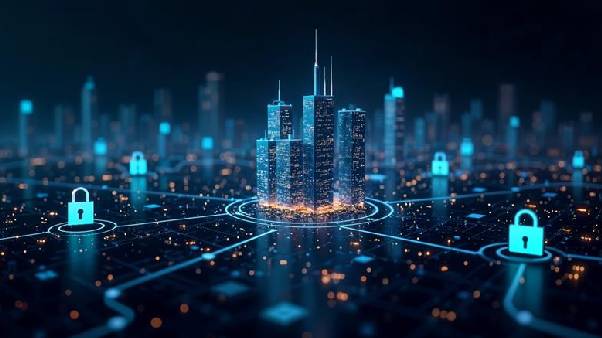"Blockchain in GCC Construction: How Smart Contracts Will Reshape Quantity Surveyors"

As the AEC industry in the GCC region continues to evolve, the integration of blockchain technology and smart contracts shall emerge as a transformative force, particularly in the realms of cost consultancy and quantity surveying. With ambitious projects like Dubai's blockchain initiatives and Saudi Arabia's NEOM development, the region is at the forefront of adopting technologies that promise enhanced transparency, efficiency, and trust in construction processes.
Dubai's Blockchain Strategy: Pioneering Government Efficiency
Dubai has positioned itself as a global leader in blockchain adoption through its comprehensive Dubai Blockchain Strategy. Launched by the Digital Dubai Office in collaboration with the Dubai Future Foundation, the strategy focuses on three pillars: government efficiency, industry creation, and international leadership.
One notable implementation is the blockchain-based registry developed with IBM and the Department of Economic Development. This registry enables multiple free zones and mainland authorities to share information on registered companies, streamlining processes and reducing redundancy.
NEOM: Saudi Arabia's Vision for a Smart Future
In Saudi Arabia, the NEOM project epitomizes the nation's commitment to integrating advanced technologies into urban development. NEOM's Oxagon, envisioned as a reimagined industrial city, aims to incorporate Industry 4.0 principles, including blockchain, to create a clean manufacturing ecosystem. By embedding technologies like robotics, AI, and IoT, NEOM seeks to revolutionize construction practices, making them more efficient and sustainable.

Real-World Application of Block chain in the GCC
DAMAC Properties
In January 2025, Dubai-based DAMAC Group signed a $1 billion deal with blockchain platform MANTRA to tokenize real-world assets, including real estate properties and data centers. This move aligns with Dubai's ambitions to establish itself as a global hub for digital and crypto assets.
Commercial Bank of Dubai (CBD)
In 2025, CBD became the first bank in the Middle East to integrate J.P. Morgan's blockchain-powered Liink network. This integration aims to improve the speed, accuracy, and security of cross-border payments by allowing businesses to verify account details before initiating transactions.
Dubai Land Department (DLD)
In 2017, DLD launched a blockchain platform to record real estate contracts, including lease and registration processes. This system enhances transparency and streamlines property transactions by linking tenants, landlords, and service providers into a unified ledger.
MAG Property Development
MAG partnered with MANTRA to tokenize $500 million in real estate assets. This supports secure, fractional ownership and digital transactions, aligning with Dubai's broader digital asset strategy.
Saudi Construction Supply Chain (Research-based)
Blockchain adoption has been studied in KSA to improve supply chain tracking, reduce project delays, and manage cost overruns, especially for large-scale infrastructure programs.
mBridge Project (UAE & KSA Participation)
Both countries are involved in the mBridge CBDC platform, enabling real-time, cross-border payments on blockchain — highly relevant to international contracting and procurement in major construction projects.

Implications for Quantity Surveying
The adoption of blockchain and smart contracts in the GCC has significant implications for quantity surveyors:
- Enhanced Transparency: Immutable records ensure all stakeholders have access to the same data, reducing disputes.
- Automated Payments: Smart contracts automate payments upon milestone completion, improving cash flow.
- Efficient Procurement: Transparent records increase accountability and streamline tendering and vendor evaluations.
Conclusion
As the GCC continues to embrace digital transformation, blockchain and smart contracts provide a path toward more transparent, efficient, and secure construction practices. For QS professionals and cost consultants, staying informed and involved in these developments is critical for driving value and future-proofing service delivery in the region.
References
- https://www.digitaldubai.ae/initiatives/blockchain
- https://newsroom.ibm.com/IBM-blockchain?item=30730
- https://www.neom.com/en-us/regions/oxagon
- https://www.reuters.com/technology/dubai-developer-damac-signs-1-bln-deal-with-blockchain-platform-mantra-2025-01-09/
- https://en.wikipedia.org/wiki/Commercial_Bank_of_Dubai
This document is intended solely for the informational purposes of those concerned and should not be relied upon as expert advice in any circumstance without consulting an expert professional. Reproduction or translation of this information is not permitted without explicit written consent from www.tccons.ae.
For additional details, please reach out to info@tccons.ae

